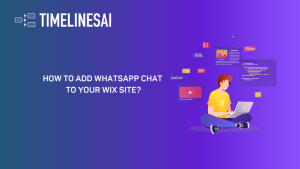WhatsApp, the messaging platform with over two billion users worldwide, has become an indispensable tool for businesses to connect with customers. However, managing a high volume of inquiries and interactions can quickly overwhelm traditional communication methods. This is where Artificial Intelligence (AI) steps in, transforming WhatsApp from a simple messaging platform into a powerful and intelligent communication channel.
WhatsApp and AI Chatbots
According to Gartner, chatbots will become the primary channel for customer service in a quarter of all businesses by 2027. This shift signifies a major transformation in how companies interact with their customers.
AI-powered chatbots leverage Natural Language Processing (NLP) and Machine Learning (ML) to understand customer queries and respond in a natural, human-like way. Here’s how AI chatbots are changing business communication on WhatsApp:
24/7 Availability: Customers can get instant answers to their questions anytime, anywhere. With AI chatbots on WhatsApp, customers can simply send a message and receive the information they need immediately, regardless of time zone or business hours. This constant availability fosters a sense of convenience and responsiveness, leading to higher customer satisfaction and loyalty.
Efficient Issue Resolution: Chatbots can handle repetitive tasks like order tracking, appointment scheduling, and basic troubleshooting. These tasks, while essential, can be time-consuming for your team. By automating these processes, chatbots free up valuable time that the team can use to focus on complex issues and build stronger relationships with customers.
Seamless Escalation: When a chatbot encounters a situation it can’t handle, it can seamlessly transfer the conversation to a human agent. This ensures that customers always receive the support they need.
Data-Driven Insights: AI chatbots are constantly learning and evolving. By analyzing customer interactions, they can identify trends and gather valuable insights into customer behavior, preferences, and pain points. Businesses can use this data to improve their products, services, and overall customer experience. For instance, by analyzing frequently asked questions, companies can identify areas where their website content or marketing materials might be unclear and make adjustments accordingly.
Scalability: Unlike human agents, AI chatbots can manage multiple conversations at once. This scalability is a game-changer for businesses, particularly during periods of high customer demand. Also, as businesses grow and their WhatsApp user base expands, AI-driven tools can efficiently handle increased customer demands.
Beyond Chatbots: The Broader Impact of AI on WhatsApp
The integration of AI in WhatsApp goes beyond chatbots. Here are some other exciting possibilities:
Sentiment Analysis: AI can analyze message tones, helping businesses understand customer satisfaction and identify potential issues before they escalate. This real-time feedback loop allows businesses to improve customer service, enhance product development, and refine marketing strategies.
Streamlined Transactions: AI can streamline transactions within WhatsApp conversations. Chatbots can securely process payments, eliminating the need to switch between apps. This can be particularly useful for businesses, allowing them to close deals and receive payments seamlessly.
Automated Lead Generation: A study reveals that 55% of businesses view online chatbots as a tool that helps them acquire higher-quality leads. AI-powered chatbots can qualify leads on WhatsApp by engaging in conversational qualification, nurturing unqualified leads, and scheduling appointments. This frees up sales teams to focus on qualified prospects and simplifies the lead conversion process.
Personalized Marketing: AI can personalize WhatsApp marketing by recommending relevant products, presenting targeted offers based on conversation context, and using multilingual communication. This approach fosters stronger customer relationships, increases marketing engagement, and leads to higher conversion rates.
Different Methods of WhatsApp-AI Integration
Here’s a look at the different methods:
1. WhatsApp Business API:
The official gateway for businesses to connect with customers on WhatsApp is the WhatsApp Business API. This API allows businesses to build and integrate AI-powered chatbots. Businesses can leverage platforms like Dialogflow (by Google Cloud) or Chatfuel to design chatbots that answer questions, manage inquiries, and even facilitate transactions within the WhatsApp chat.
2. Third-Party Integration Tools:
Several third-party platforms like Timelines AI specialize in bridging the gap between AI and WhatsApp. These platforms offer pre-built chatbots or chatbot development tools that can be easily integrated with a business’s existing WhatsApp account. These tools often come with user-friendly interfaces and drag-and-drop functionalities, making AI integration accessible even for those without extensive coding experience.
3. Generative AI:
This is a cutting-edge approach that utilizes AI models capable of generating text, translating languages, or even creating images. While not yet mainstream on WhatsApp, generative AI has the potential to revolutionize communication. Imagine a chatbot that can translate messages in real time during a conversation or one that can generate personalized product descriptions based on user preferences.
Meta, the company behind WhatsApp, is actively developing its own generative AI project, META AI, which is currently in beta in the USA. The future might see deeper integration of META AI functionalities within the WhatsApp Business API, leading to even more sophisticated AI-powered solutions for businesses.
Meta’s Vision: Chatting with Meta AI in WhatsApp
Meta has already begun rolling out its AI assistant, “Meta AI,” in the United States in beta across WhatsApp, Messenger, and Instagram. This marks a major step forward in integrating AI chat experiences into these popular messaging platforms.
Meta’s ambition goes beyond a single assistant. They’re introducing a cast of 28 unique AI characters across their messaging apps. Meta AI will also allow users to generate images through prompts like “/imagine.” In early demos, the tool produced high-resolution images in seconds.
Meta has emphasized on a friendly and conversational tone for Meta AI, avoiding the robotic or bland responses common in some existing chatbots. It is designed to provide clear and straightforward answers to user queries.
With its focus on user experience, safety, and future social media integration, Meta AI has the potential to transform the way businesses interact with customers and how users engage with these platforms. This is an exciting development to watch.
Integrating AI into Your WhatsApp Strategy: Best Practices
By embracing AI, businesses can unlock the full potential of WhatsApp and create a more engaging, efficient, and personalized communication experience for their customers. Here are some tips to get you started:
- Define Your Goals: The first step is clearly knowing your objectives. Are you aiming to enhance customer service by offering 24/7 support? Perhaps your focus is on lead generation through automated qualification or nurturing leads via chatbots. Identifying your goals will guide your AI selection and ensure it aligns with your overall WhatsApp strategy.
- Choose the Right Solution: A diverse variety of chatbot solutions are available out there. Carefully evaluate your needs and budget. Consider pre-built chatbots for common tasks like order tracking, or explore custom development if you require more specialized functionalities. Remember, the ideal solution should seamlessly integrate with your existing systems and workflows.
- Train Your Bot: Think of your chatbot as a new team member. To excel, it needs proper training. Provide your chatbot with a good training data set that includes customer queries, common scenarios, and desired responses. This equips your chatbot to understand customer intent and deliver accurate, helpful information.
- Continuously Monitor and Improve: Regularly monitor your chatbot’s performance and make adjustments as needed. By continuously learning and adapting, you ensure it remains effective and delivers an exceptional user experience.
- Focus on Transparency: Be transparent about using AI chatbots on WhatsApp. Inform customers when they’re interacting with a bot and provide a clear and easy way to connect with a human agent if their needs are more complex.
- Prioritize User Experience: The goal is to create a natural and positive experience for users interacting with your AI on WhatsApp. The AI integration should feel intuitive and helpful, not intrusive or frustrating. Aim for clear and concise responses so that the customers feel valued and supported.
How Timelines AI Enhances Customer Communication?
Managing customer inquiries on WhatsApp can be time-consuming. Timelines AI offers a solution: a ChatGPT-powered autoresponder for your business.
This means you can:
- Automate basic replies: Free up your team by automatically answering frequently asked questions and simple inquiries.
- Seamless ChatGPT integration: Leverage the power of ChatGPT to generate natural and informative responses.
- Multilingual support: Reach a wider audience with responses in multiple languages
Benefits:
- Improved Customer Satisfaction: Get faster response times and consistent, accurate information.
- Simple Setup: Get started with the autoresponder easily as no coding skills are required for the setup.
Conclusion: The Future of AI in WhatsApp
The integration of AI in WhatsApp is still evolving, but it’s already transforming the user experience. From 24/7 customer support to personalized interactions, AI chatbots are making communication on WhatsApp faster, easier, and more efficient.
Looking ahead, generative AI holds immense potential to further revolutionize WhatsApp communication. Imagine chatbots that can translate languages in real time or create personalized product descriptions on the fly! Meta’s recent introduction of Meta AI, with its focus on user experience and diverse functionalities, offers a glimpse into the exciting future of AI-powered communication within WhatsApp. As AI technology continues to develop, we can expect even more innovative features and functionalities that will redefine how businesses and users interact on this messaging platform.
- What is WhatsApp Marketing and Is It Legal in India? [2024] - May 16, 2024
- Best WhatsApp Marketing Services and Solutions in Dubai, UAE - May 16, 2024
- How to Add WhatsApp Chat to Your Wix Site? - May 16, 2024



